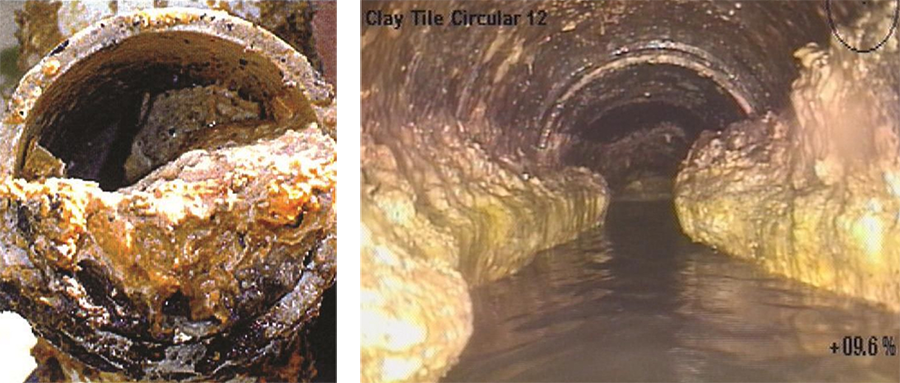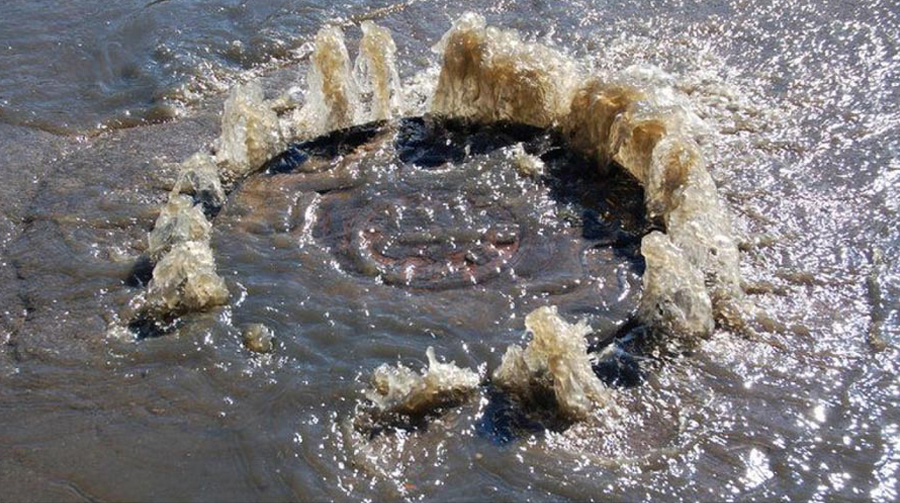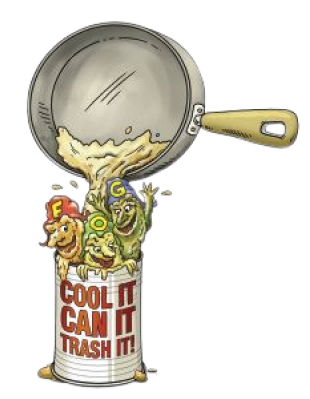What is FOG?
FOG is fats, oils, and grease that can build-up in private and City sanitary sewer pipes. When FOG is washed down the sink or toilet it coats and sticks to the inside of sewer pipes.
What are the most common sources of FOG?
FOG comes from meat fats (bacon, sausage) lard, cooking oil, butter or margarine, food scraps, baking products, milk, ice cream, yogurt, sour cream, cream-based sauces, salad dressings, cheeses and mayonnaise.
Why is FOG a Problem?
Sanitary sewer pipes can become clogged by FOG and cause backups into basements, roadways, and water bodies. Wastewater backups create health hazards, can result in expensive property damage, and threaten the environment. Large amounts of FOG in the wastewater is problematic for collection system pipes. It decreases pipe capacity and requires that piping systems be cleaned more often and/or some piping to be replaced sooner than otherwise expected. FOG also hampers effective treatment at the wastewater treatment plant.

(Above) Private lateral and City sewer pipe with FOG:

Sewage overflow due to FOG blockage:
How does it affect me?
Improper FOG disposal leads to costly wastewater backups and overflows, increased sewer rates and waterway challenges. FOG build-up in sewer pipes is costly to clean requiring public works staff to go to the site and remove the blockage. Grease related blockages can cause wastewater to backup into streets, parks, and yards resulting in public health and environmental concerns.
What Can I Do?
The Norwalk WPCA needs the help of all our residents to keep our collection system flowing properly. Residents can take the following steps to reduce and eliminate FOG from entering Norwalk’s collection system.
- Never pour oil and grease down the sink, toilet or any drains.
- Put used oil and grease in covered containers and cans for proper disposal.
- Wipe down greasy pots and pans with a dry paper towel and dispose in the trash.
- Scrape food scraps and discards into the trash or compost receptacle. Avoid using the garbage disposal.
- Do not rely on a garbage disposal to get rid of grease. It grinds waste into smaller pieces but it does not keep grease from going down the drain.
- Do not run hot water over greasy pans or use hot water to wash grease down the drain. The grease will eventually cool and congeal in your pipe.
More Ways to Tackle Grease
- Keep drains clean by pouring ½ cup baking soda down the drain followed by ½ cup vinegar. Wait 10 to 15 minutes and then rinse with hot water.
- Use environmentally safe cleaning products instead of harsh detergents or cleaners that can damage sewer lines.
- If you generate large amounts of used cooking oil, consider reusing or recycling it. If you generate small amounts of cooking oil, reuse it as often as possible and then pour it into a disposal container. Never pour it down the drain.
- Residents of Norwalk can bring cooking oil to the Transfer Station for proper disposal.


